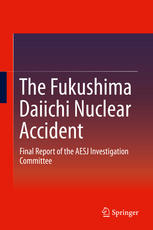

Most ebook files are in PDF format, so you can easily read them using various software such as Foxit Reader or directly on the Google Chrome browser.
Some ebook files are released by publishers in other formats such as .awz, .mobi, .epub, .fb2, etc. You may need to install specific software to read these formats on mobile/PC, such as Calibre.
Please read the tutorial at this link: https://ebookbell.com/faq
We offer FREE conversion to the popular formats you request; however, this may take some time. Therefore, right after payment, please email us, and we will try to provide the service as quickly as possible.
For some exceptional file formats or broken links (if any), please refrain from opening any disputes. Instead, email us first, and we will try to assist within a maximum of 6 hours.
EbookBell Team

4.3
98 reviewsThe Magnitude 9 Great East Japan Earthquake on March 11, 2011, followed by a massive tsunami struck TEPCO’s Fukushima Daiichi Nuclear Power Station and triggered an unprecedented core melt/severe accident in Units 1 – 3. The radioactivity release led to the evacuation of local residents, many of whom still have not been able to return to their homes.
As a group of nuclear experts, the Atomic Energy Society of Japan established the Investigation Committee on the Nuclear Accident at the Fukushima Daiichi Nuclear Power Station, to investigate and analyze the accident from scientific and technical perspectives for clarifying the underlying and fundamental causes, and to make recommendations. The results of the investigation by the AESJ Investigation Committee has been compiled herewith as the Final Report.
Direct contributing factors of the catastrophic nuclear incident at Fukushima Daiichi NPP initiated by an unprecedented massive earthquake/ tsunami – inadequacies in tsunami measures, severe accident management, emergency response, accident recovery and mitigations – and the underlying factors - organizational issues, etc., have been clarified and recommendations in the following areas have been made.
- Nuclear safety fundamentals- Direct factors of the accident
- Organizational aspects
- Common items (R&D, International cooperation, human resources management)
- Post-accident management/recovery from the accident.